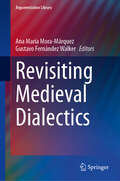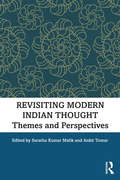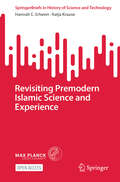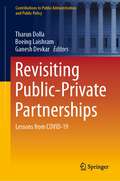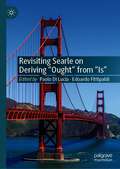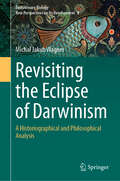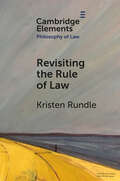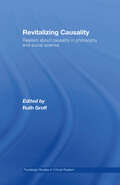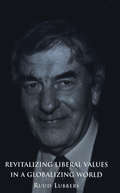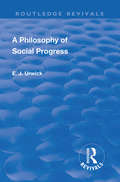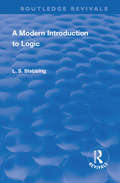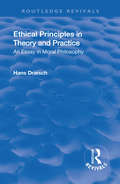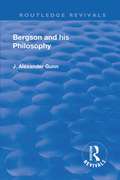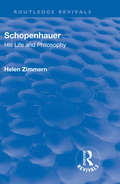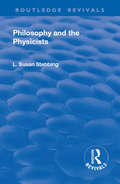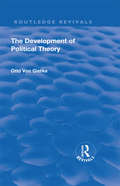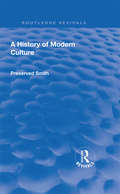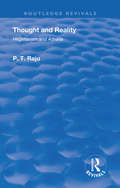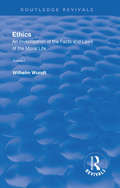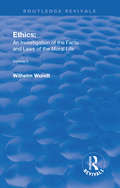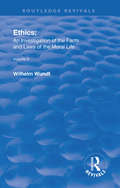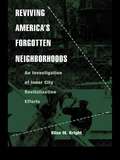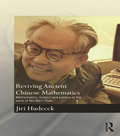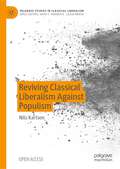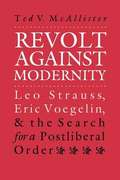- Table View
- List View
Revisiting Medieval Dialectics (Argumentation Library #44)
by Ana María Mora-Márquez Gustavo Fernández WalkerThis book presents a collection of essays by prominent young researchers and established scholars on the medieval reception of Aristotle&’s Topics in the Latin, Arabic and Hebraic traditions, as well as on its late-ancient sources in Alexander of Aphrodisias and Boethius. The book thus provides a fruitful engagement with the late-ancient to medieval reception of the Topics, a tradition that has been understudied in recent scholarship. The collected contributions revisit the reception of the Topics focusing on historical analyses of dialectics as a general method of argumentation and as a scientific method. The authors studied in this book range from well-known figures such as Alexander, Boethius, Buridan and Avicenna, to the lesser-known Radulphus Brito, Judah ben Shlomo ha Kohen, and Ibn Tumlus. This book is an important contribution to the study of argumentation theory in the historical past and is of interest to scholars of the historical development of dialectical argumentation and argumentation theorists.
Revisiting Modern Indian Thought: Themes and Perspectives
by Suratha Kumar Malik; Ankit TomarThis book presents a comprehensive account of the socio-political thought of prominent modern Indian thinkers. It offers a clear understanding of the basic concepts and their contributions on contemporary issues. Key features: Explores the nature, scope, relevance, context, and theoretical approaches of modern Indian thought and overviews its development through an in-depth study of the lives and ideas of major thinkers. Examines critical themes such as nationalism, swaraj, democracy and state, liberalism, revolution, socialism, constitutionalism, secularism, satyāgraha, swadeshi, nationbuilding, humanism, ethics in politics, democratic decentralisation, religion and politics, social transformation and emancipation, and social and gender justice under sections on liberal-reformist, moderate-Gandhian, and leftist-socialist thought. Brings together insightful essays on Raja Ram Mohan Roy, Ishwar Chandra Vidyasagar, Dayānanda Saraswati, Ramakrishna Paramhansa, Pandita Ramabai, Periyar E. V. Ramasamy, Jyotirao Govindrao Phule, Babasaheb Ambedkar, Dadabhai Naoroji, Gopal Krishna Gokhale, Mahatma Gandhi, Jawaharlal Nehru, Subhas Chandra Bose, Ram Manohar Lohia, Babu Jagjivan Ram, Vinoba Bhave, Acharya Narendra Deva, Manabendra Nath Roy, and Jayaprakash Narayan. Traces different perspectives on the way India’s composite cultures, traditions, and conditions inf luenced the evolution of their thought and legacy. With its accessible style, this book will be useful to teachers, students, and scholars of political science, modern Indian political thought, modern Indian history, and political philosophy. It will also interest those associated with exclusion studies, political sociology, sociology, and South Asian studies.
Revisiting Premodern Islamic Science and Experience (SpringerBriefs in History of Science and Technology)
by Katja Krause Hannah C. ErlweinThis open access book takes a fresh look at the nature and place of experience in premodern Islamic science. It seeks to answer two questions: What kind of experience constituted premodern Islamic science? And in what ways did that experience constitute science? Answering these questions, the authors critique the trajectory of most existing histories of the period, which tend to reduce “experience” to empirical method or practice. This view reflects the emphasis that histories of modern science, especially of the Scientific Revolution, have placed on empiricism—the standard against which Islamic actors were then measured. This book offers a new historiography, arguing that experience had a far wider scope in the world of Islamic science. Combining an innovative theoretical framework with three case studies and a reflective epilogue by renowned experts in the field, this work offers the history of science a solid foundation on which to build its analyses of premodern science and the modality, scope, and role of experience therein. As a result, it speaks to specialists in the history of premodern Islamic science and historians of science in general to reconsider their historiographical assumptions.
Revisiting Public-Private Partnerships: Lessons from COVID-19 (Contributions to Public Administration and Public Policy)
by Boeing Laishram Tharun Dolla Ganesh DevkarThis edited volume discusses the resilience of public-private partnerships (PPPs) in the wake of the COVID-19 pandemic. Using a comparative lens, the book assesses the degree to which global PPP infrastructure projects have been affected by the pandemic and details short term and long-term measures undertaken by governments and private parties to mitigate disruption to infrastructure delivery. Secondly, it focuses on improving the state-of-art knowledge by suggesting future directions to be taken by governments, practitioners, and researchers in order to create resilience in infrastructure projects when using PPPs as the delivery model. Chapters present diverse case studies of PPP governance across countries, covering topics such as regulatory issues, risk management, financing, contractual governance, arbitration, and stakeholder management. Providing a systematic review, assessment, and research agenda on lessons learned from the pandemic, this volume will appeal to researchers and students of public administration, public economics, construction management, infrastructure management, and public management, as well as practitioners and government professionals.
Revisiting Searle on Deriving "Ought" from "Is"
by Paolo Di Lucia Edoardo FittipaldiThis book reconsiders the supposed impossibility of deriving "Ought" from "Is". John R. Searle’s 1964 article How to Derive "Ought " from "Is’’ sent shockwaves through the philosophical community by offering a straightforward counterexample to this claim of impossibility: from your promising something- and this is an "is" - it simply follows that you "ought" to do it. This volume opens with a brand new chapter from Searle who, in light of his subsequent philosophical developments, expounds the reasons for the validity of that derivation and its crucial significance for social ontology and moral philosophy. Then, in a fresh interview with the editors of this volume, Searle explores a range of topics including how his derivation relates to constitutive rules, and how he views Wittgenstein’s philosophy, deontic logic, and the rationality of action. The remainder of the volume is dedicated to a deep dive into Searle’s essay and its implications by international scholars with diverse backgrounds ranging from analytic philosophy, phenomenology, and logic, to moral philosophy and the philosophy and sociology of law. With thirteen original chapters, the contributors provide fresh and timely insights on hotly debated issues: the nature of "Ought"; the logical structure of the social world; and the possibility of deriving not only "Ought" from "Is", but "Is" from "Ought".
Revisiting the Eclipse of Darwinism: A Historiographical and Philosophical Analysis (Evolutionary Biology – New Perspectives on Its Development #8)
by Michał Jakub WagnerThis book focuses on a critical reexamination of two prominent categories used in modern historiography of biology – “the eclipse of Darwinism” and the “modern synthesis”. The main objective is to critically analyze the main existing interpretations of the “eclipse of Darwinism” and emergence of the “modern synthesis”, with particular emphasis on the philosophical assumptions adopted in these interpretations. Thus, interpretations by Ernst Mayr, Peter Bowler, Mark Largent and modern historians who challenge these perspectives are discussed and critically evaluated The analysis of the above interpretations makes it possible to determine how the philosophy of science limits the interpretation of the history of a given field, and also serves as a starting point for proposing an original interpretation of the above period in the history of evolutionary biology. The ultimate goal will therefore be a proposal of a new interpretative perspective to answer following questions: Why did the “eclipse of the Darwinism” occur? How should its origins to be understood? Why did it end (and why did the “modern synthesis” emerge)? Main thesis of this book is that the “eclipse” was a direct response to inconsistent ontology upon which Darwin built his theory of evolution. Darwin referred to terms and concepts rooted in the philosophy of essentialism, which was problematic, because he tried to apply these essentialist concepts to his vision of the ever-changing nature. Therefore, all of the anti-Darwinian theories characteristic to the “eclipse of Darwinism” and later to the “modern synthesis” were produced in an attempt to reconcile essentialism with evolution and thus to correct Darwin's philosophical “error.” The book will appeal to biologists, philosophers and historians alike.
Revisiting the Rule of Law (Elements in Philosophy of Law)
by Kristen RundleThis Element offers an accessible introduction to theoretical writing on the rule of law for anyone who wants to understand more about how we think and write about this central idea of legal and political thought. Part 1, 'Approaching the Rule of Law', examines the methods through which the idea of the rule of law is typically approached by those who set out to theorise it. Part 2, 'Untangling the Rule of Law', asks whether it is possible to untangle the rule of law from the various contributions, companions, connections, conflations and controversies with which it tends to be associated. Part 3, 'Revisiting the Rule of Law', signals to new frontiers of rule of law thought by addressing the assumptions about legal form that shape its theoretical treatment, and by investigating what we know about the people who carry its burdens and benefit from its offerings.
Revitalizing Causality: Realism about Causality in Philosophy and Social Science (Routledge Studies in Critical Realism)
by Ruth GroffThis cutting edge collection of new and previously published articles by philosophers and social scientists addresses just what it means to invoke causal mechanisms, or powers, in the context of offering a causal explanation. A unique collection, it offers the reader various disciplinary and inter-disciplinary divides, helping to stake out a new, neo-Aristotelian position within contemporary debate.
Revitalizing Liberal Values in a Globali
by Ruud LubbersThe longest serving Dutch Prime Minister (1982-94), Professor Lubbers is known for his support of liberal values, social equity, human rights, democratic governments, and spirituality. In this book he explores ways to conciliate these values with global economization.Dr. Lubbers argues that the global economy created by new information technologies has led to a competitive world atmosphere that works against social equity, local movements, and national interests. In this context he urges that steps be taken to ensure that the new era evolves in the interests of justice, peace, and fairness. Such steps may include combining the governance of nation states; providing development assistance; supporting initiatives in legislation and jurisprudence, such as an international criminal court, and initiating a global dialogue on values. For Dr. Lubbers, liberal values mean a "just, sustainable, and participatory society."This volume presents the third in a series of lectures that offer reflections by well-known figures on topical, liberal-oriented themes. This particular lecture has the distinction of never having been delivered, since Toronto was in the midst of a crippling snowstorm on the afternoon of 14 January 1999, when Lubbers was scheduled to speak at Victoria University. The two earlier volumes in the series present lectures by John Kenneth Galbraith and Michael Ignatieff.
Revival: 2nd Edition (Routledge Revivals)
by Edward Johns UrwickThis book was originally written with a double purpose; The first reason was to introduce students to a conception of a social philosophy which should be definitely linked to modern sociology, and not to be treated as a mere outgrowthof the older physical philosophy. The second reason, was to establish a new position in regard to the philosophical conception of social change – a position in opposition to that usually assumed both by the sociologist and by the philosopher.
Revival: A Modern Introduction to Logic (Routledge Revivals)
by Lizzie Susan StebbingAs the author of this volume states, "the science of logic does not stand still." This book was intended to cover the advances made in the study of logic in the first half of the nineteenth century, during which time the author felt there to have been greater advances made than in the whole of the preceding period from the time of Aristotle. Advances which, in her eyes, were not present in contemporary text books. As such, this book offers a valuable insight into the progress of the subject, tracing this frenetic period in its development with a first-hand awareness of its documentary value.
Revival: An Essay in Moral Philosophy (Routledge Revivals)
by Hans DrieschAlmost all the existing modern systems of Ethics deal with formal definitions, and at bottom repeat more or less the same thing about them in slightly different words. In this work these are a side issue, and therefore are treated briefly. Their treatment in Section I is based upon the author’s theoretical works the Theory of Order and the Theory of Reality, but will be intelligible to those who are not acquainted with those works. The chief concern is moral teaching – that is, the practical element.
Revival: Bergson and His Philosophy (Routledge Revivals)
by J. Alexander GunnThe stir caused in the civilised world by the writings of Bergson, particularly during the past decade, is evidenced by the volume of the stream of exposition and comment which has flowed and is still flowing. If the French were to be tempted to set up, after the German manner, a Bergson-Archiv they would be in no embarrassment for material, as the Appendix to this book – limited though it wisely is – will show. Mr. Gunn, undaunted by all this, makes a further, useful contribution in his unassuming but workmanlike and well-documented account of the ideas of the distinguished French thinker. It is designed to serve as an introduction to Bergson’s philosophy for those who are making their first approach to it, and as such it can be commended.
Revival: His Life And His Philosophy (Routledge Revivals)
by Helen ZimmernIn the following pages are outlined the Life and Philosophy of one of the most original and picturesque intellectual giants of our age. For while Schopenhauer offers marked analogies to Johnson, Rousseau and Byron, and yields in interest to none of them, he was at the same time a man of absolutely unique mould.
Revival: Philosophy And The Physicists (1937) (Routledge Revivals)
by Lizzie Susan StebbingThis book is written by a philosopher for other philosophers and for that section of the reading public who buy in large quantities and, no doubt, devour with great earnestness the popular books written by scientists for their enlightenment. We common readers, to adapt a phrase from Samuel Johnson, are fitted neither to criticize physical theories not to decide what precisely are their implications. We are dependent upon the scientists for an exposition of those developments which – so we find them proclaiming – have important and far-reaching consequences for philosophy. Unfortunately, however, our popular expositors do not always serve us very well. The two who are most widely read in this country are Sir Arthur Eddington and Sir James Jeans. They are not always reliable guides. Their influence has been considerable upon the reading public, upon theologians, and upon preachers; they have even misled philosopher who should have known better. Accordingly, it has seemed to me to be worth while to examine in some detail the philosophical views that they have put forth and to criticize the grounds upon which these views are based.
Revival: The Development of Political Theory (Routledge Revivals)
by Otto von GierkeThis book deals with the life and doctrines of an almost forgotten German scholar whose political doctrine deserves in the writer’s opinion a prominent place in the history of political science. Consideration is also given to the great importance of the juristic writings of this author for the history of legal systematism.
Revival: The Enlightenment 1687 - 1776 (Routledge Revivals)
by Preserved SmithThe understanding of history can be advanced only by the combination or alternation, of analysis and synthesis. Detailed research and generalizing survey are not antiethical but complementary. For a long time, however, the specialist has reigned supreme in our schools. The need is now, surely, for a return to synoptic writing. The present work was undertaken to supply the need of a synthesis. It is a map of a large region, not a geological chart of a square mile or the plan of a single city. Its value, if any, lies in its view of the interrelations of large tracts of social and intellectual life, not in the intensive investigation of narrow fields.
Revival: Thought and Reality - Hegelianism and Advaita (1937)
by Poolla Tirupati RajuThis work is a contribution to certain aspects of idealistic philosophy. It is a comparative study, yet it is not a comparison for the sake of comparison. This book examines the supra-rational Absolutism of the West developed under the Hegelian influence, and in the light of the criticisms shows the peculiar character of the Advaita Vedanta of Sankara. It is therefore not a mere exposition, but a criticism and construction. The discussions are not cosmological, but epistemological and metaphysical, approached from the side of logic. The work may also be viewed as a reorientation of Sankara's system. It places Sankara’s philosophy in line with the idealistic philosophies of the West, so that we can understand the peculiarities of the former in terms of the latter. It thus discovers or brings into clearer light the guiding principle of Sankara’s thought. It brings out the full significance of the principles of non-contradiction applied by Sankara as a test of truth and reality, and shows its difference from the same principle as understood by Hegel and the Hegelians. The aim of this work is to attempt at laying the metaphysical foundation of the logic of supra-rational Absolutism, the interpretation of Advaita is based mostly on polemical works.
Revival: Volume I: Introduction: The Facts of Moral Life (Routledge Revivals)
by Wilhelm WundtIt has been my object in the present work to investigate the problems of ethics in the light of an examination of the facts of moral life. One reason for this procedure is my desire to conduct the reader by the same path that I myself have followed in approaching ethical questions.
Revival: Volume II: Ethical Systems (Routledge Revivals)
by Wilhelm WundtThe present work aims to investigate the problems of ethics in the light of an examination of the facts of moral life.
Revival: Volume III: The Principles of Morality and the Sphere of their Validity (Routledge Revivals)
by Wilhelm WundtIt has been my object in the present work to investigate the problems of ethics in the light of an examination of the facts of moral life. One reason for this procedure is my desire to conduct the reader by the same path that I myself have followed in approaching ethical questions.
Reviving America's Forgotten Neighborhoods: An Investigation of Inner City Revitalization Efforts (Contemporary Urban Affairs)
by Elise M. BrightThis book examines both successful and unsuccessful efforts at revitalizing low-income neighborhoods and features case studies on a wide range of American cities.
Reviving Ancient Chinese Mathematics: Mathematics, History and Politics in the Work of Wu Wen-Tsun (Needham Research Institute Series)
by Jiri HudecekTwentieth-century China has been caught between a desire to increase its wealth and power in line with other advanced nations, which, by implication, means copying their institutions, practices and values, whilst simultaneously seeking to preserve China’s independence and historically formed identity. Over time, Chinese philosophers, writers, artists and politicians have all sought to reconcile these goals and this book shows how this search for a Chinese way penetrated even the most central, least contested area of modernity: science. Reviving Ancient Chinese Mathematics is a study of the life of one of modern China’s most admired scientific figures, the mathematician Wu Wen-Tsun. Negotiating the conflict between progress and tradition, he found a path that not only ensured his political and personal survival, but which also brought him renown as a mathematician of international status who claimed that he stood outside the dominant western tradition of mathematics. Wu Wen-Tsun’s story highlights crucial developments and contradictions in twentieth -century China, the significance of which extends far beyond the field of mathematics. On one hand lies the appeal of radical scientific modernity, "mechanisation" in all its forms, and competitiveness within the international scientific community. On the other is an anxiety to preserve national traditions and make them part of the modernisation project. Moreover, Wu’s intellectual development also reflects the complex relationship between science and Maoist ideology, because his turn to history was powered by his internalisation of certain aspects of Maoist ideology, including its utilitarian philosophy of science. This book traces how Wu managed to combine political success and international scientific eminence, a story that has wider implications for a new century of increasing Chinese activity in the sciences. As such, it will be of great interest to students and scholars of Chinese history, the history of science and the history and philosophy of mathematics.
Reviving Classical Liberalism Against Populism (Palgrave Studies in Classical Liberalism)
by Nils KarlsonThis open access book by Nils Karlson explores the strategies used by left- and right-wing populists to make populism intelligible, recognizable, and contestable. It presents a synthesized explanatory model for how populists promote autocratization through the deliberate polarization of society. It traces the ideational roots of the core populist ideas and shows that these ideas form a collectivistic identity politics. Karlson argues that to fight back requires the revival of liberalism itself by defending and developing the liberal institutions, the liberal spirit, liberal narratives, and liberal statecraft. The book also presents and discusses an extensive list of counterstrategies against populism. Written within the tradition of political theory and institutional economics, this book uses a wide variety of sources, including results and analyses from social psychology, ethics, law, and history.
Revolt Against Modernity: Leo Strauss, Eric Voegelin, and the Search for a Postliberal Order (American Political Thought)
by Ted V. McAllisterEric Voegelin and Leo Strauss are two of the most provocative and durable political philosophers of this century. Ted McAllister's study provides the first comprehensive comparison of their thought and its profound influence on contemporary American conservatism. McAllister's study will appeal to anyone engaged in the volatile debates over liberalism's demise and conservatism's rise.
